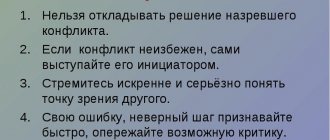Constructive functions of conflict
Among them are:
- Cognitive. The emergence of a conflict situation is a symptom of dysfunctional relations between subjects, a manifestation of emerging contradictions.
- Developmental. It is conflict that acts as a tool for resolving emerging contradictions.
- Instrumental. Contradictions act as a tool for solving problems.
- Perestroika. With the help of conflict, it is possible to remove factors that undermine interpersonal interactions, which stimulates the formation of normal relationships between participants in the dialogue.
Advantages and disadvantages
Let us highlight the positive functions of conflict. These include reducing tensions between warring parties. Conflict makes it possible to obtain new information about the opponent. The company's team is united in the fight against one external enemy.
Among the advantages of conflict situations, one can also note stimulation for development and change, elimination of the submissive syndrome in subordinates, and diagnosis of additional opportunities.
With the right approach to the problem that has arisen, you can determine the causes of the problem, eliminate them, and move to a new level of relationship.
Now let's highlight the negative functions of conflict. They involve significant emotional and material costs from all participants. The result of contradictions is the dismissal of employees, a decrease in the psychological and social climate in the team, and a decrease in labor discipline.
Based on the results of the conflict, an idea is formed about the defeated subjects, as well as about their opponents (“enemies”).
The negative functions of conflict have a destructive effect on cooperation between individual team members; it is quite difficult to restore business relationships after a problematic situation.
Accentuation of character and type of behavior in conflict
During adolescence and adolescence, some distinctive character traits become clearly expressed. Then these characteristics (accentuations) leave an imprint on a person’s entire life, on the way he interacts with others and on his productive activities.
Accentuations are closely related to human behavior in a conflict situation. Typically, types with stronger emotionality and a desire for communication and dominance behave more aggressively in an argument and show rivalry. These are excitable, exalted and hyperthymic types of accentuation.
Cycloid types are more likely to compromise with their opponents. But opportunism and avoidance are chosen mainly by emotive individuals. Since their functions are to preserve public peace and be responsive to the problems of others.
Elements and structure of interpersonal conflict
A systematic study of conflicts made it possible to identify individual elements in them:
- subjects with their personal characteristics, goals and motives;
- supporters of the situation;
- the reason for the controversy.
Conflict functions characterize the connections between individual elements. Since the components of contradictory relationships systematically change, we can talk about the constant development of the conflict.
It can cause dissatisfaction and a decrease in labor efficiency, and cause unproductive competition with other people considered as hostile groups.
The strengthening of such qualities leads to the fact that instead of solving a specific problem, significant importance is attached to achieving “success” in the current conflict. It not only weakens communications, but also causes the destruction of business relationships.
Heraclitus (VI – V centuries BC) made an attempt to reveal the cause of movement, to present the movement of things and phenomena as a necessary, natural process generated by the struggle of opposites. He argued that the struggle is universal and “everything happens through struggle and out of necessity.” The first generalizations concerning the role of such a social conflict as war date back to this period. Heraclitus considered war the father and king of all things, and Plato (428 - 348 BC) considered it as the greatest evil. In his opinion, there once was a “golden age” when “people loved each other and treated each other kindly.”
Thomas Aquinas (1225-1274) , developing thoughts about the admissibility of wars in the life of society, defined one of the conditions for a just war: for it there must be “authorized competence,” that is, a sanction from the government. Although in general, in his opinion, “war and violence are always a sin.”
One of the first attempts at a systematic analysis of social conflicts was made by the Florentine theorist and statesman Niccolo Machiavelli (1469-1527). He considered conflict a universal and continuous state of society due to the vicious nature of man, the desire of various groups of people for constant and unlimited material enrichment. He saw in conflict not only a destructive, but also a creative function.
Conflict as a multi-level social phenomenon was first studied in the work of Adam Smith (1723-1790) “An Inquiry into the Nature and Causes of the Wealth of Nations.” The conflict is based on the division of society into classes (capitalists, landowners, wage workers) and economic rivalry. A. Smith considered the confrontation between classes as a source of progressive development of society, and social conflict, therefore, as a certain benefit of humanity.
The German philosopher Immanuel Kant (1724-1804) believed that the state of peace between people living next door is not natural. The latter, on the contrary, is a state of war, i.e. if not continuous hostile actions, then a constant threat. Therefore, the state of the world must be established.
The problem of the struggle for existence occupied a central place in the teachings of the English biologist Charles Darwin (1809-1902) . The content of his theory of biological evolution is set out in the book “The Origin of Species by Natural Selection, or the Preservation of Favored Breeds in the Struggle for Life,” published in 1859. The main idea of this work is formulated in the title itself - the development of living nature is carried out in conditions of a constant struggle for survival, which constitutes a natural mechanism for selecting the most adapted species. Subsequently, Charles Darwin's views were developed in some sociological and psychological theories of conflict.
According to the Anglo-American psychologist W. McDougall (1871-1938) , conflicts in society are inevitable, since people have social instincts such as fear, herding, self-affirmation, etc. They are inherited, so people constantly conflict and enter into confrontation. Based on C. Darwin’s statement that the instinct of struggle for survival ensures the existence and development of the species, W. McDougall extended it to human society
The beginning of the ethological approach to the conflict was laid in the 30s of the 20th century by the works of the Austrian naturalist, Nobel Prize winner Konrad Lorenz (1903-1989). For the first time in world science, he put forward the hypothesis that the main cause of social conflicts is the aggressiveness of the individual and the crowd. According to K. Lorenz, the mechanisms of aggression in animals and humans are the same, and aggression is a constant state of a living organism.
Social psychologist J. Moreno (1892-1974) developed the theory of sociometry. In accordance with it, interpersonal conflicts are determined by the state of emotional relationships between people, their likes and dislikes towards each other. J. Moreno came to the conclusion that all conflicts, from interpersonal to international, can be resolved by rearranging people in accordance with their emotional preferences, so that the “sociometric revolution” makes it possible to harmonize social relations.
Ralf Dahrendorf (1929-2009) developed the theory of social conflict. Conflict is a natural result of any system of government. The essence of social conflict lies in the difference in social positions and roles in society: some have power and the right to rule, others do not have such privileges. As a result, the aggravation of contradictions within society may be due to a number of reasons: disproportion in the distribution of power and the absence of free channels for the redistribution of power.
However, conflicts in society can be regulated and conflict interactions can be managed. For this purpose, there are social institutions that develop rules of behavior for conflicting parties. Overcoming the conflict is divided into several stages: awareness of their interests by opposing groups, unification and redistribution of power. The result of any conflict situation is social changes in society.
Russian conflict researchers: A.Ya. Antsupov, N.V. Grishina, A.G. Zdravomyslov, N.N. Obozov, T.G Sulimova, A.I. Shipilov and others.
The formation of conflictology as a science occurs in the 50-60s. XX century In Russia, conflictology became an independent science around 1990.
Specifics of destructive functions
The negative functions of social conflict are that contradictions interfere with achieving goals. Destruction leads to the following consequences:
- dissatisfaction, poor morale, staff turnover, deterioration in the quality of work;
- a decrease in the degree of cooperation in the future, the destruction of the system of established communications;
- absolute devotion to the group and unproductive competition with other parts of the team;
- perceptions of the other side of the conflict as an enemy;
- complete termination of relations between the parties;
- increasing hostility between groups, the emergence of hostility and hatred between them;
- shifting emphasis;
- the possibility of preparing for the next round of conflict, a violent solution to the emerging problem.
Typology of conflict
Taking into account the organization of society, the formation of conflict situations occurs at a certain level:
- between individuals;
- in groups;
- large subsystems or systems;
- states.
In social psychology, the following types of conflicts of an individual are distinguished. In this case, acute negative experiences of a person arise, which are generated by conflicting desires.
For example, in Freud's psychoanalysis such a conflict is seen as the result of a contradiction between moral feelings, instinctive impulses, and real demands. By their nature and content, such situations are caused by contradictions of motives, interests, and self-esteem of the individual. They are accompanied by negative experiences and serious emotional stress.
Interpersonal conflict can be constructive or destructive, leading to positive or negative consequences for an individual.
It can be based on various reasons:
- contradiction of basic needs;
- difficulty choosing between different behavior options.
The functions of political conflicts are associated with serious misunderstandings between government bodies and structures.
An example of such conflicts is the armed invasion of one state into the territory of another country. The reasons that lead to such situations can be different:
- desire to master material and natural resources;
- thirst for exploration of new territories;
- an attempt to prove your advantage over your rivals.
Types of behavior in conflict
What models of behavior in conflict exist? There is a constructive model, a destructive and conformist one.
Destructive behavior in conflict is noted
- the desire to expand the conflict and involve new participants;
- humiliation of the personality of another (as a method of influence);
- violation of communication ethics;
- intimidation of an opponent;
- focusing on one’s own position and authority;
- using flattery and ingratiation.
The latter always shows passivity in a dispute and agrees with all demands, even contrary to her own values. This model is also not considered constructive, because when a person refuses his own position, responsibility for himself, he unintentionally becomes the cause of conflict.








